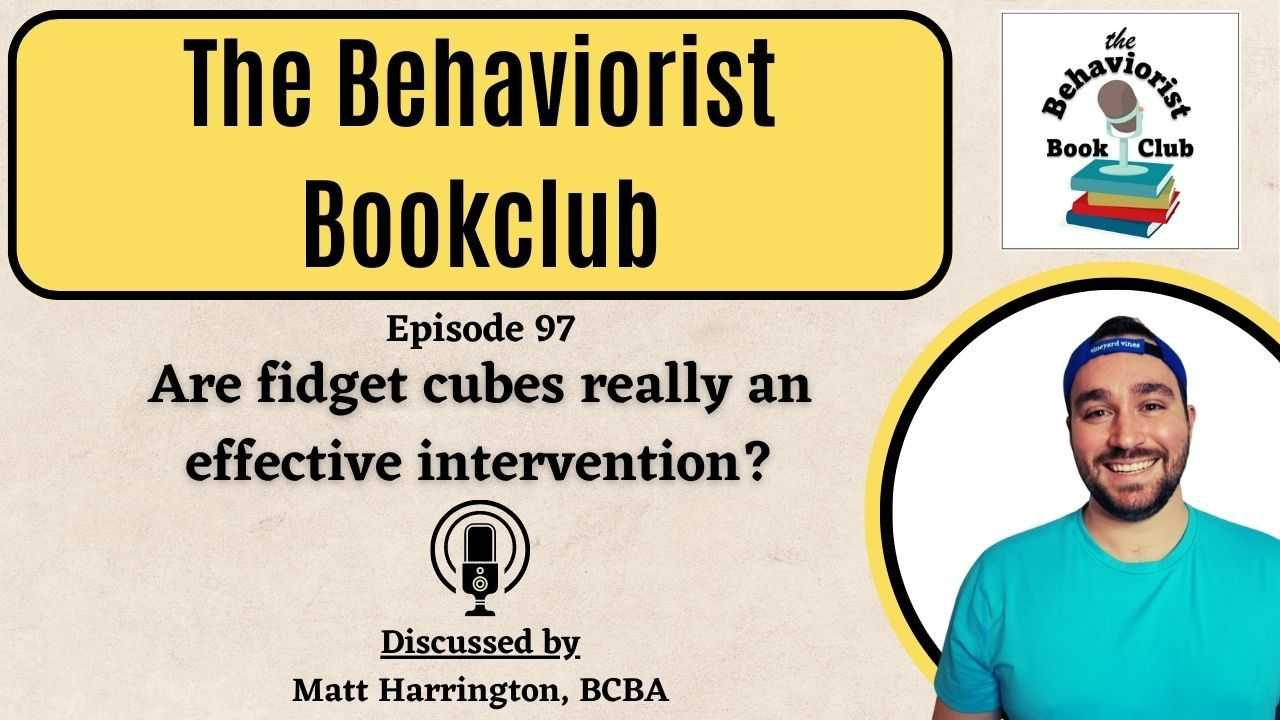Ep. 97- Are fidget cubes really an effective intervention?
Sep 26, 2023
Resources mentioned in this episode
- Free 2 CEU course on Solving Clinical Challenges with Research- www.behavioristbookclub.com/solving
- Croley et al., 2023- https://link.springer.com/article/10.1007/s40617-022-00734-4
Please contact Matt @ [email protected] if you have any questions or if you need help accessing the full article!
Full Transcript (Click for downloadable copy)
The following blog post was written by Chat GPT after providing the full transcript and requesting an accompanying blog post. For more information about why and how I use Chat GPT, please see this accompanying blog post -> Why I use Chat GPT for my Show Notes (behavioristbookclub.com)
Exploring Sensory-Based Interventions in the Classroom: A Critical Review
Welcome to the Behaviorist Book Club blog, where we delve into the latest research and insights surrounding behavior analysis and its practical applications. In this post, we'll be discussing a recent podcast episode titled "The Behaviorist Book Club," hosted by Matt Harrington, where he explores the effects of sensory-based interventions, specifically the use of fidget cubes, on classroom behavior among students with perceived attention difficulties. We'll break down the key points from the podcast and provide a comprehensive review of the discussed topic.
Introduction to Sensory-Based Interventions
Sensory-based interventions have gained popularity in various fields, particularly in occupational therapy, as a way to address sensory needs and improve behavior. These interventions aim to provide sensory stimulation that matches an individual's sensory preferences, ultimately assisting in maintaining focus, reducing anxiety, and enhancing overall well-being. One common tool in this realm is the fidget cube, a multi-sided device with various sensory features designed to provide tactile and kinesthetic stimulation.
The Study: Effects of Fidget Cube on Classroom Behavior
The podcast episode revolves around a research study titled "Effects of the fidget cube on classroom behavior among students with perceived attention difficulties" conducted by Croley and colleagues. The study sought to investigate whether the use of fidget cubes could positively impact on-task behavior and academic performance among students with attention challenges. The participants were selected based on teachers' perceptions of attention difficulties, introducing an interesting discussion point about the inclusion criteria for such studies.
Examining the Study's Findings
Matt Harrington critically reviews the study's findings and methodology. The study measured variables such as completion of math worksheets, percent engagement with the fidget cube, and accuracy of completed worksheets. The results indicated that there was no significant improvement in these measures when the fidget cube was introduced as an intervention. This aligns with prior research on the limited effectiveness of certain sensory-based interventions, including fidget spinners, in enhancing on-task behavior and academic performance.
Individualization and Matched Stimulation
One central point of discussion in the podcast is the importance of individualized sensory-based interventions. The term "sensory-based intervention" can encompass a wide range of tools and strategies. However, the effectiveness of such interventions heavily relies on the precise matching of sensory preferences for each individual. The podcast highlights that the study's use of a generic fidget cube without tailored sensory profiles for each participant might have contributed to the lack of significant outcomes.
Collaboration between Behavior Analysts and Occupational Therapists
Matt Harrington emphasizes the significance of collaboration between behavior analysts and occupational therapists when designing and implementing sensory-based interventions. Occupational therapists possess specialized knowledge about sensory needs and can provide valuable insights into creating effective individualized interventions. Collaborative efforts ensure a more comprehensive understanding of sensory preferences and a more precise approach to addressing sensory needs.
Expanding Measurement of Effects
A notable critique raised by Matt Harrington is the limited focus on objective outcomes, such as completion of worksheets, in the study. He suggests that incorporating subjective measures, such as affect scores and social validity assessments, could provide a more holistic understanding of the impact of sensory-based interventions. Additionally, exploring the effects of sensory interventions on anxiety and stress related to school could offer valuable insights.
Conclusion: The Future of Sensory-Based Interventions
In conclusion, the podcast episode sheds light on the complexities of sensory-based interventions and their application in educational settings. While the study discussed did not yield significant results in terms of academic performance, it sparks important conversations about the individualization of interventions and the need for collaboration between professionals from various fields. As behavior analysts, incorporating insights from occupational therapy and exploring nuanced measurement methods can contribute to more effective and meaningful interventions for individuals with sensory needs.
The Behaviorist Book Club podcast encourages a thoughtful approach to incorporating evidence-based practices and practitioner-focused research into everyday clinical work. The podcast reminds us that while certain interventions may not yield immediate results, ongoing collaboration, research, and adaptation are crucial for enhancing our understanding and improving the lives of the individuals we serve.
Sign up below to get instant access to Clarifying Trauma Informed Care!
This 5 hour, 3 CEU course is all about helping you understand the complexities of trauma informed care so you can implement evidenced based ABA through a compassionate lense.
Signing up will also subscribe you to the email list. Unsubscribe at anytime! We will never sell your information, for any reason.


